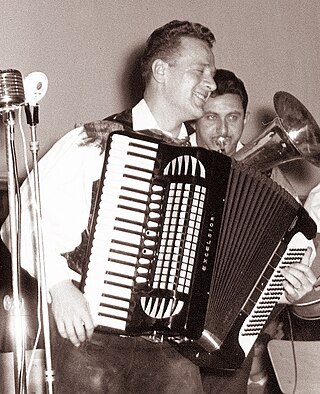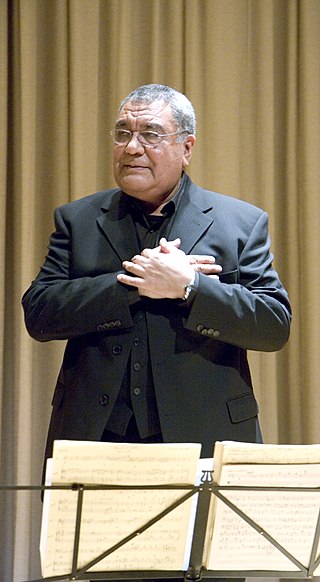
Polka is a dance and genre of dance music originating in nineteenth-century Bohemia, now part of the Czech Republic. Though associated with Czech culture, polka is popular throughout Europe and the Americas.

Frank John Yankovic was an American accordion player and polka musician. Known as "America's Polka King", Yankovic was considered the premier artist to play in the Slovenian style during his long career. He was not related to fellow accordionist "Weird Al" Yankovic, although the two collaborated.

Slavko Avsenik was a Slovene composer and musician. Beginning in 1953 with the formation of the Avsenik Brothers Ensemble, Avsenik produced more than 1,000 songs and garnered success both in Slovenia and in other parts of Europe and America, and is viewed as a Slovenian cultural icon.
In the minds of many foreigners, Slovenian folk music means a form of polka that is still popular today, especially among expatriates and their descendants. However, there are many styles of Slovenian folk music beyond polka and waltz. Kolo, lender, štajeriš, mafrine and šaltin are a few of the traditional music styles and dances.

The vast majority of the inhabitants of the United States are immigrants or descendants of immigrants. This article will focus on the music of these communities and discuss its roots in countries across Africa, Europe and Asia, excluding only Native American music, indigenous and immigrant Latinos, Puerto Rican music, Hawaiian music and African American music. The music of Irish- and Scottish-Americans will be a special focus, due to their extreme influence on Appalachian folk music and other genres. These sorts of music are often sustained and promoted by a variety of ethnic organizations.
A cover band is a band that plays songs recorded by someone else, sometimes mimicking the original as accurately as possible, and sometimes re-interpreting or changing the original. These remade songs are known as cover songs. New or unknown bands often find the format marketable for smaller venues, such as pubs, clubs or parks. The bands also perform at private events, for example, weddings and birthday parties, and may be known as a wedding band, party band, function band or band-for-hire. A band whose covers consist mainly of songs that were chart hits is often called a top 40 band. Some bands, however, start as cover bands, then grow to perform original material. For example, the Rolling Stones released three albums consisting primarily of covers and then recorded one with their own original material.

Mina Anna Maria Mazzini or Mina Anna Quaini, known mononymously as Mina, is an Italian singer and actress. She was a staple of television variety shows and a dominant figure in Italian pop music from the 1960s to the mid-1970s, known for her three-octave vocal range, the agility of her soprano voice, and her image as an emancipated woman.
Bobby Cruz, is a salsa singer and religious minister. He was part of the duo Richie Ray & Bobby Cruz. Both Cruz and Ray became religious ministers and as such founded over 70 Christian churches during the time they retired from popular music, which lasted about 16 years.

"Beer Barrel Polka", originally in Czech "Škoda lásky", also known as "The Barrel Polka", "Roll Out the Barrel", or "Rosamunde", is a 1927 polka composed by Czech musician Jaromír Vejvoda. Lyrics were added in 1934, subsequently gaining worldwide popularity during World War II as a drinking song.
Banda is a subgenre of regional Mexican music and type of ensemble in which wind and percussion instruments are performed.

Timoteo "Dino" Saluzzi is an Argentinian bandoneon player. He is the son of Cayetano Saluzzi and the father of guitarist José Maria Saluzzi.
Buldožer was a Yugoslav-Slovenian progressive rock band from the 1970s and 1980s. They were one of the first bands in communist Yugoslavia that could be considered Avant-prog, and forefathers of the Yugoslav new wave. In musical sense, they experimented with a variety of genres, while most of their lyrics, written in Serbo-Croatian, were a satire and mockery of the political and musical establishment, themselves included.

Richie Kamuca was an American jazz tenor saxophonist.

Roots is a 1968 studio album by American singing duo the Everly Brothers. Originally on the Warner Bros. label, the album was re-released on CD in 1995 by Warner Bros. and in 2005 by Collectors' Choice Music. The album is a classic example of early country rock.
Polka is a music and dance style that originated in Bohemia in the 1830s and came to American society with immigrants from Europe. A fast style in 2
4 time, and often associated with the pre–World War II era, polka remains a dynamic "niche" music in America.
The accordion is in a wide variety of musical genres, mainly in traditional and popular music. In some regions, such as in Europe and North America, it has become mainly restricted to traditional, folk and ethnic music. Nonetheless, the button accordion (melodeon) and the piano accordion are widely taught and played in Ireland, and have remained a steady fixture within Irish traditional music, both in Ireland and abroad, particularly in the United States and Great Britain. Numerous virtuoso Irish accordion players have recorded many albums over the past century or so; the earliest Irish music records were made in the 1920s, in New York City, by fiddler and Sligo immigrant Michael Coleman, widely considered to have paved the way for other traditional musicians to record themselves. Accordions are also played within other Celtic styles, as well as in English traditional music, American traditional music, polka, Galician folk music, and Eastern European folk music.
Walter Solek or Walt Solek was a Polish-American lyricist, musician, performer, and radio show host who introduced English-language lyrics into polka music in the United States. Solek was known as the "Clown Prince of Polka" and died on April 1, 2005, at the age of 94.
For music from an individual year in the 1940s, go to 40 | 41 | 42 | 43 | 44 | 45 | 46 | 47 | 48 | 49








